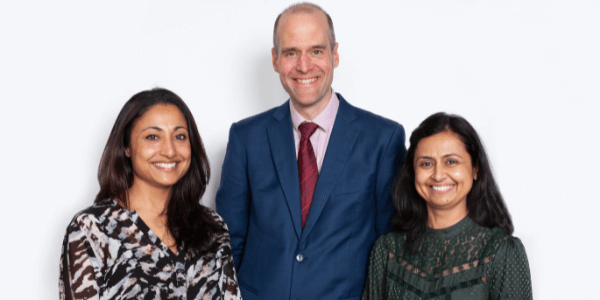Expert Interview: Genetic Testing for Cancer with Anjana Kulkarni

A cancer diagnosis can feel overwhelming, both for the patient and their loved ones. But when cancer appears to run in the family, it can also leave people asking if they have an inherited form of the disease and whether other family members might be at risk.
Most cancers are due to environmental, hormonal and lifestyle factors but some, such as breast, ovarian and bowel cancers, can be linked to inherited gene changes, referred to as mutations. Although genetic testing for cancer has become much more widely available over the last decade, it is not always offered to newly diagnosed patients even when cancer appears to cluster in the family.
A recent study led by the Institute of Cancer Research found that under current NHS criteria for genetic testing, only around half of people with a genetic risk for cancer are identified.
Consultant Clinical Geneticist Dr Anjana Kulkarni and her colleagues Professor Marc Tischkowitz and Dr Vishakha Tripathi lead the comprehensive cancer genetics service at King Edward VII’s Hospital, which has just launched with its first pathway for breast cancer.

Inherited gene mutation can cause breast cancer
Although only 3% to 5% of breast cancers are caused by an inherited gene mutation, she says there are certain ‘red flags’ which might indicate a higher risk. Younger women who have been diagnosed with breast cancer as well as those with a strong family history of breast or ovarian cancer, particularly when it has occurred pre-menopause, might benefit from genetic testing.
‘Breast cancer is very common,’ she says. ‘If a woman is diagnosed in her sixties with breast cancer, the likelihood is that it is what we would call ‘sporadic’, meaning it is linked to environmental, lifestyle, hormonal or other lower-risk genetic factors. But even then, if she has a very strong family history of cancer, it might still be important to explore the possibility of an inherited mutation in the family.’

What happens at a genetic testing appointment?
During the initial consultation and pre-test counselling, Dr Kulkarni and the team of genetics experts at King Edward VII’s Hospital take a full clinical and family history to determine whether genetic testing would be beneficial, decide which genes to test and discuss the implications of the test results with the patient.
‘Our job is to complete the jigsaw puzzle by pulling all the information together so we can see which genes might be responsible for the pattern of cancer in the family or individual history,’ she says.
The test itself is relatively simple. DNA is collected via a blood sample and a panel of different genes analysed for mutations linked to breast cancer risk.
Genetic testing: a powerful tool in the fight against breast cancer
The most commonly recognised are BRCA1 and BRCA2 mutations. These genes normally protect us from cancer by correcting damage that occurs during natural cell division or from environmental factors. However, if there is an inherited mutation in the gene, that protective effect is lost, which is why it can result in cancer occurring earlier in life.
Advances in genetic sequencing over the past 20 years have made genetic testing a powerful tool in the fight against cancer. Results are normally available within a few weeks and for women with a diagnosis, can be used to inform and deliver more personalised treatment, such as PARP inhibitors, which specifically target cancers caused by BRCA1 and BRCA2 mutations.
Women whose cancer is caused by an inherited gene mutation might wish to consider their surgical options, such as those which involve removal of all breast tissue rather than a lumpectomy. And they may need lifelong screening. According to Dr Kulkarni, it is important that these discussions take place as part of a multidisciplinary team with input from all the relevant specialists, including support from a genetic counsellor and psychologist.
For predictive testing – where women don’t have cancer but have a family history of a gene mutation – she says high quality genetic counselling is vital.
It was an inherited BRCA1 mutation which led actor Angelina Jolie to undergo a double preventative mastectomy in 2013. Her decision might sound extreme but according to Dr Kulkarni, so too is the elevated risk associated with an inherited BRCA1 gene mutation and that can carry a huge psychological burden.
‘Testing somebody who has not got cancer for a mutation that we know about in the family is complex and it’s very important that patients have good quality pre-test and post-test counselling,’ she explains. ‘The risk of somebody with a BRCA1 gene mutation developing breast cancer in their lifetime from the age of 30 up to the age of 80 can be as high as 75%. And that is a very high risk compared with 12% in the general population.’

Knowing your risk can help you make decisions
Ultimately, many women would prefer to know their risk so they can take preventative action. An alternative to surgery might be participation in regular screening programmes. And for some inherited cancer conditions, such as Lynch Syndrome, which can increase the risk of bowel, ovarian and endometrial cancers, preventative drug therapy is available.
‘There is also a chance that we don’t find a mutation in one of the genes we are looking at, but that doesn’t necessarily mean that there isn’t a mutation somewhere – we have over 20,000 different genes,’ Dr Kulkarni explains. ‘If there is a strong family history, we might still be worried that the person has a high risk of breast cancer in the future so we might still need to ensure they get the right screening and that may also require psychological support.’
Angelina Jolie’s experience highlighted the benefits of genetic testing for breast cancer, but increased awareness and availability have also led to the proliferation of high street and direct to consumer testing. And this, says Dr Kulkarni, can have negative impacts both in terms of test accuracy and access to ongoing professional support.
The message for those women who feel testing would be beneficial for them – whether post-diagnosis or because of their family history – is to ensure they choose a reputable hospital or clinic.
‘I think we’re going to move towards testing more people at the point of cancer diagnosis and more people who are worried about their risk of cancer within a preventative health screening setting,’ says Dr Kulkarni. ‘And that’s all very positive, but it is really important that we have good governance and clear robust pathways for patients to access support and specialist input.’
More information
● If you are concerned about breast cancer, you should make an appointment to see your GP straight away (Don’t have a GP? King Edward VII’s Hospital has GPs available for same day appointments)
● The Kind Edward VII’s Hospital Genetics Department offers specialised genetic testing for breast cancer supported by counselling to help you make healthcare decisions right for you.
● The Kind Edward VII’s Hospital Breast Health Unit is a fully equipped unit, staffed by experts with access to the most up to date tests and treatments.









